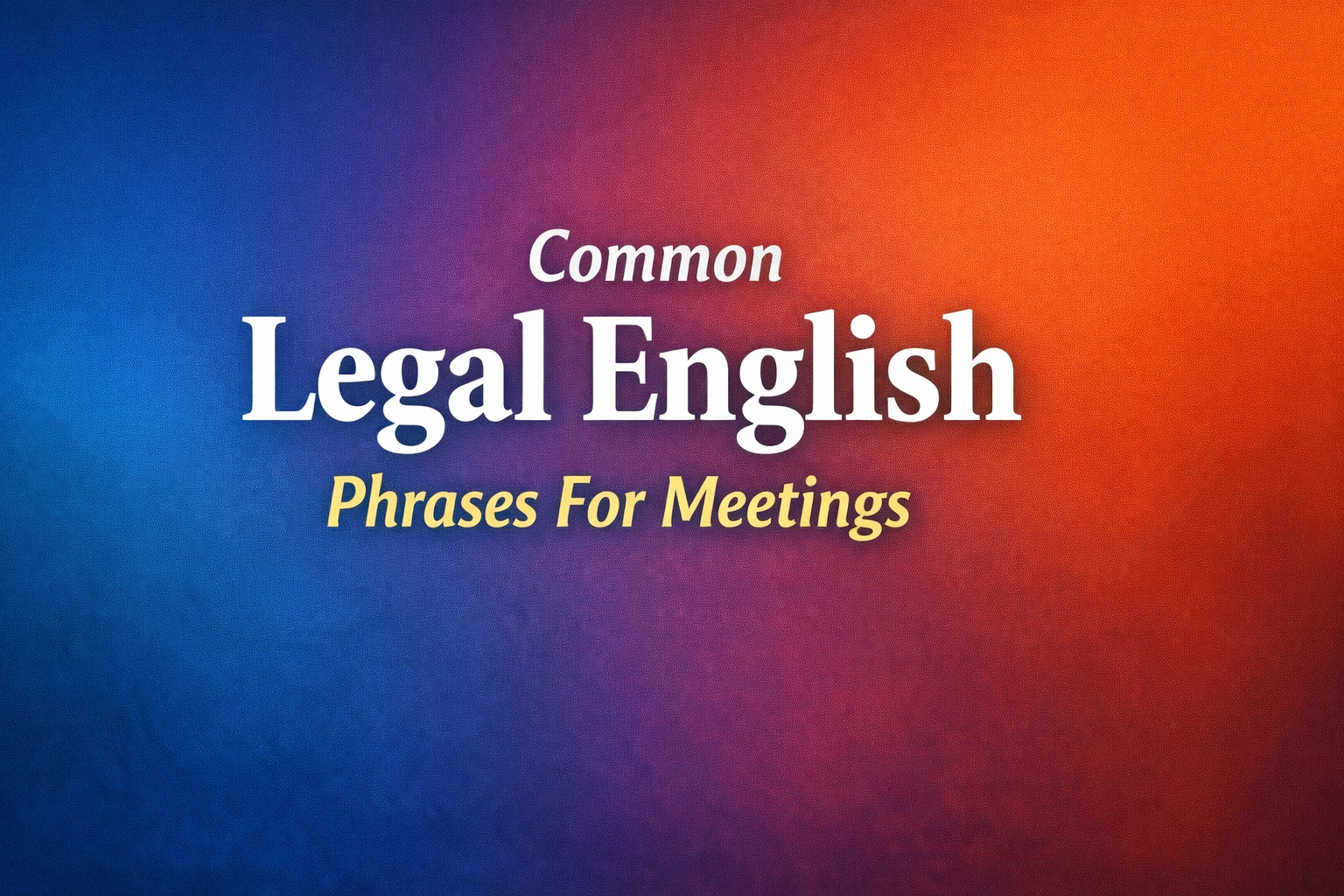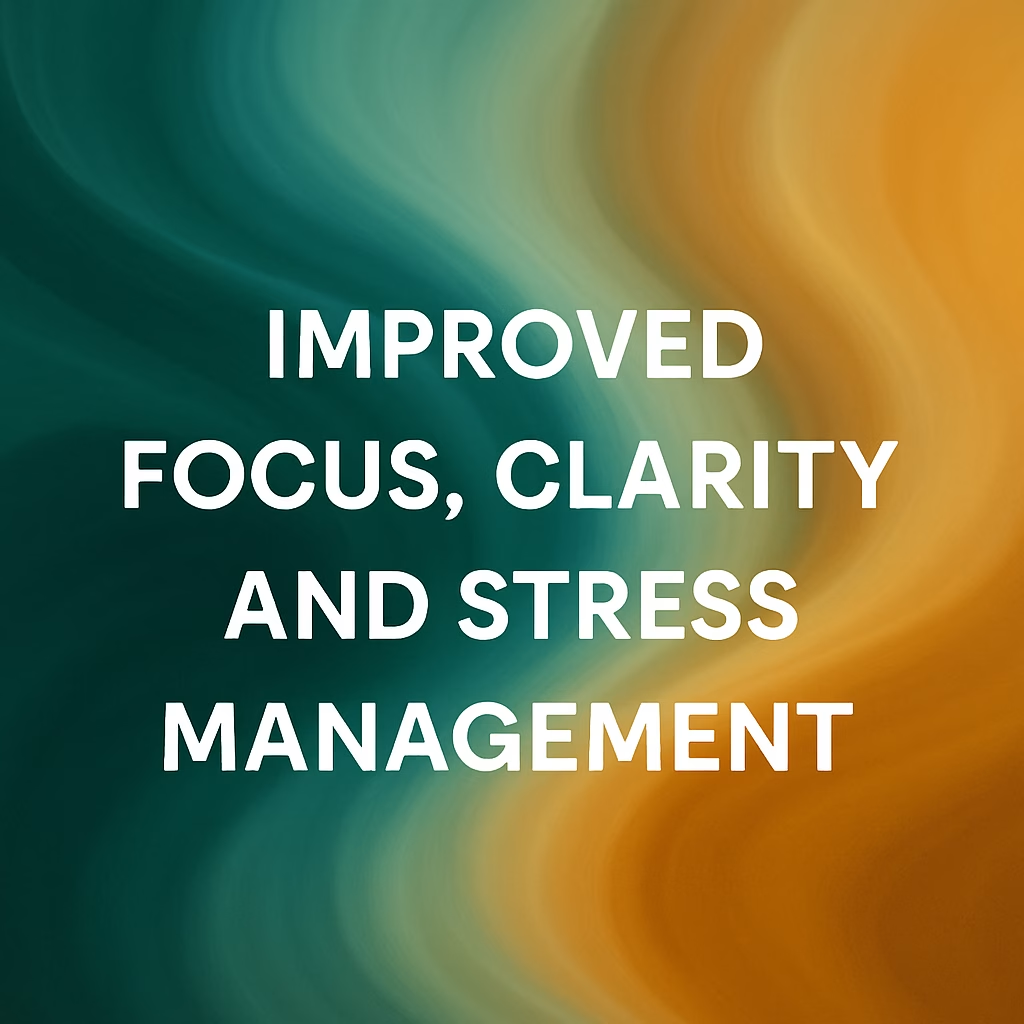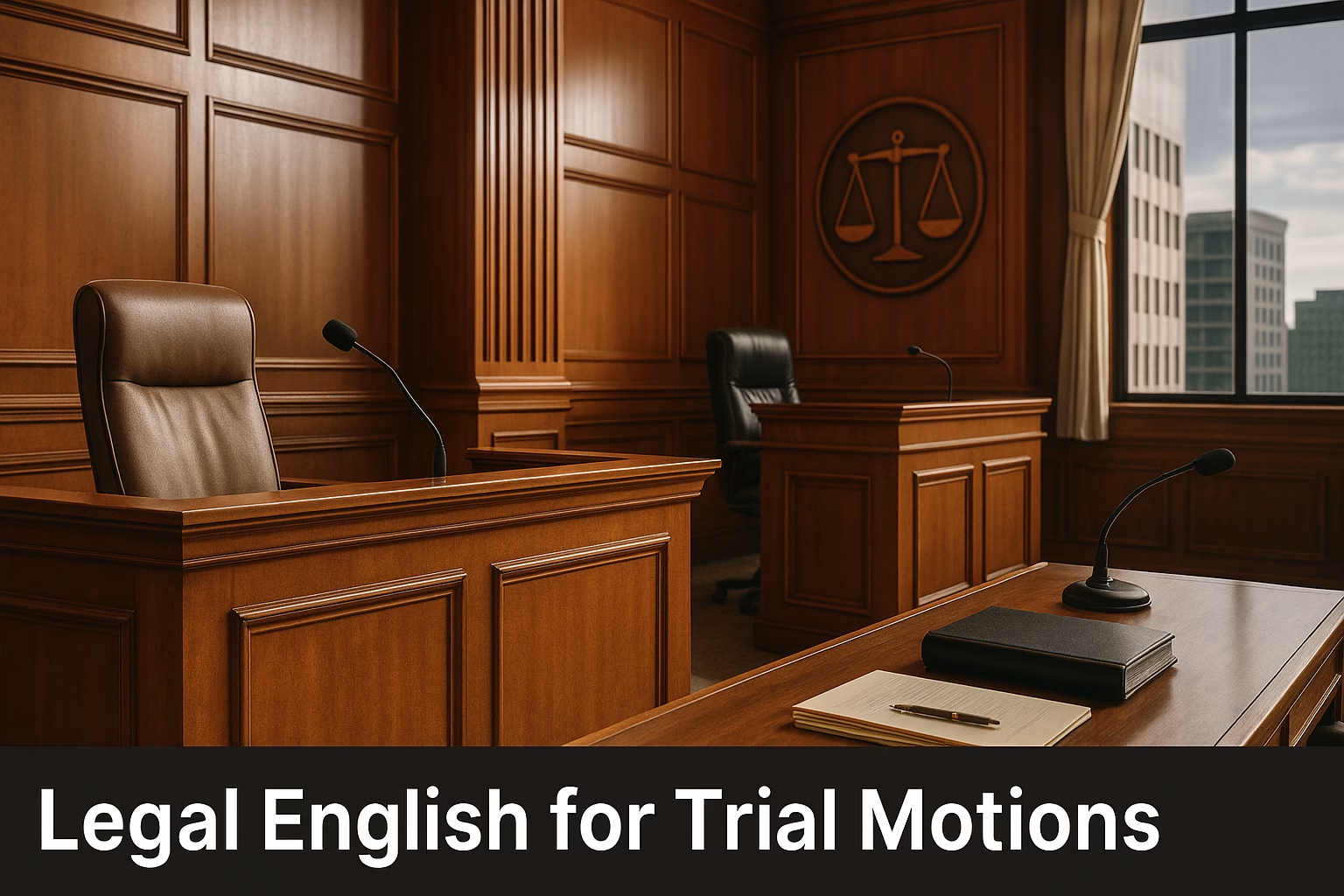
Ready to Go Deeper?
At LegalEnglish4Lawyers.com, we don’t just define legal terms — we explore them through real documents, client scenarios, and clause-by-clause analysis.
Click here to see a quick view of all posts.
-
Legal English for Lawyers: 20 Real Phrases Lawyers Use to Talk About Their Cases
Introduction:
This list of legal English phrases may seem somewhat random — and that’s because it is. These expressions come directly from real conversations with lawyers about their cases, clients, and court proceedings. Each one reflects how legal professionals actually speak in practice, not just how they write.
For non-native English-speaking lawyers, learning these authentic phrases will help you sound natural and confident in professional discussions, client meetings, and legal correspondence.
Key Phrases Lawyers Actually Use
1. Minimum Billable Hours
Refers to the minimum amount of time a lawyer must bill within a set period.
Example: “Associates must meet the firm’s minimum billable hours each quarter.”2. Still at Square One
Means no progress has been made; you are back where you started.
Example: “After months of discovery, we’re still at square one.”3. Half the Estate
Used to indicate a proportional share in property or inheritance.
Example: “She claimed half the estate under the will.”4. Carved Out
Something intentionally excluded from a broader deal or arrangement.
Example: “Intellectual property rights were carved out of the merger agreement.”5. In Probate
Describes assets or property being reviewed by a probate court.
Example: “The property remains in probate until the executor completes the filings.”6. A Bona Fide Dispute
A genuine, good-faith disagreement between parties.
Example: “The court found a bona fide dispute regarding the creditor’s claim.”7. The Objections Were Relevant
A phrase used when the court sustains well-founded objections.
Example: “The objections were relevant and properly sustained.”8. Claiming Sole Ownership of Half the Estate
Used to describe an inconsistent position in property or inheritance cases.
Example: “He was claiming sole ownership of half the estate.”9. Joint Tenancy
A form of co-ownership giving both parties equal rights and survivorship.
Example: “They held the property in joint tenancy with right of survivorship.”10. Prenup Agreement
Short for “prenuptial agreement,” a contract made before marriage defining financial and property rights.
Example: “They signed a prenup agreement to protect their separate assets.”11. Assets
Everything of value owned by a person or entity.
Example: “The underlying assets will be distributed according to the trust.”12. On the Record
Statements officially entered into the court record or transcript.
Example: “Counsel requested to make her comments on the record.”13. Separate Property
Property owned individually and not subject to division at divorce.
Example: “The court ruled the investment account was separate property.”14. Community Property
Assets acquired during marriage that belong equally to both spouses.
Example: “The house purchased after marriage is community property.”15. Postnup Agreement
A contract made after marriage defining financial or property rights.
Example: “They signed a postnup agreement clarifying ownership of the business.”16. Settlement Strategy
A plan outlining how a party intends to negotiate or resolve a dispute.
Example: “Before mediation, we discussed our settlement strategy with the client.”17. An Asset Protection Scheme
A structure designed to shield property from creditors or claims.
Example: “The trust was challenged as an asset protection scheme.”18. Burden of Proof
The obligation to establish a claim or defense to the required legal standard.
Example: “The burden of proof rests with the plaintiff.”19. Absent an Express Stipulation or Mechanism
Formal phrasing meaning “unless the contract provides otherwise.”
Example: “Absent an express stipulation or mechanism, the default rule applies.”20. Delay Tactics
Actions intended to postpone proceedings or slow litigation.
Example: “The opposing counsel’s repeated continuance requests were clear delay tactics.”Try Personalized Lessons with a Legal English Teacher
At LegalEnglish4Lawyers.com, you can learn directly from an experienced lawyer and Legal English teacher.
Lessons focus on both Legal English and Business English, helping you:- Master the vocabulary of contracts, litigation, and negotiations
- Build confidence when communicating with clients and colleagues
Ready to start? Book your personalized lesson today.
Disclaimer
The content provided herein is only for discussion purposes and may contain errors. The reader is responsible for confirming the accuracy of the information provided. The content does not constitute legal or professional advice. We disclaim any liability for any loss or damage incurred directly or indirectly from the use of this information.
Other Posts
Legal English VocabularyCommon Legal English Phrases For Meetings
Introduction Legal meetings are often fast-paced, informal in tone, and full of expressions that nev…
Focus & ProductivityHow Lawyers Can Use Breathwork To Reduce Stress and Improve Clarity and Focus
Introduction: Breathwork Affects Clarity, Focus and Stress. Controlled breathwork from the yogic tra…
Legal English Vocabulary25 Essential Contract Drafting Verbs Every Lawyer Should Know
Introduction: Contract drafting relies heavily on precise verbs, and choosing the right one can affe…
Legal English VocabularyLegal English for Lawyers: 20 Real Phrases Lawyers Use to Talk About Their Cases
Introduction: This list of legal English phrases may seem somewhat random — and that’s because it is…
Artificial Intelligence Key WordsHow CEOs Are Talking About AI in the Workplace: 21 Key Terms Lawyers Should Know
Introduction: Artificial intelligence (AI) is transforming not only how businesses operate but also …
Everyday English for Lawyers27 Useful English Expressions for Lawyers in the Workplace
Strengthen Your Communication Inside and Outside the Office with 27 Useful English Expressions for L…
ProductivityReduce Stress After Work With the Powerful Technique of One-Pointedness (Ekāgratā)
Reduce stress, restore calm, and gain clarity after a busy day with one-pointedness (ekāgratā) as de…
Legal English (General)Mastering Legal English: 8 Strategies for Non-Native English-Speaking Lawyers and Law Students
Introduction. For lawyers and law students who speak English as a second language, developing fluenc…
Phrasal VerbsLegal English Phrasal Verbs – Part 2: 10 More Key Expressions Every Lawyer Must Know
Introduction. Legal professionals use phrasal verbs every day—often without even realizing it. Wheth…
8 Part Litigation SeriesAppeals and Enforcement – 8 Key Legal English Vocabulary Words – Litigation Vocabulary Series – Part 8
Introduction To Legal English for Appeals and Enforcement. The litigation process doesn’t always end…
8 Part Litigation SeriesJudgment and Remedies: 8 Key Legal English Words – Legal English Litigation Vocabulary Series – Part 7
Introduction To Judgment & Remedies. When a trial concludes, the court enters its decision—and t…
8 Part Litigation SeriesThe Trial Stage Legal English Vocabulary – 8 Essential Litigation Vocabulary Terms- Part 6
Introduction To The Trial Stage. The trial is the culmination of months—or years—of litigation strat…
-
How CEOs Are Talking About AI in the Workplace: 21 Key Terms Lawyers Should Know
Introduction:
Artificial intelligence (AI) is transforming not only how businesses operate but also the language we use to describe work. As The Wall Street Journal recently reported, Walmart’s CEO Doug McMillon has warned that AI will “literally change every job.”
This post breaks down 21 key AI vocabulary terms being used to describe the workplace, with clear explanations and examples to help lawyers, law students, and in-house counsel use them confidently in professional contexts.
Key Vocabulary and Phrases
1. Agent Builder
A brand-new job role where employees design and maintain AI tools, often specializing in creating conversational AI or “agents” for specific business purposes. Walmart recently introduced this position, showing how novel roles are emerging as AI spreads.
Example: “The retailer hired agent builders to create AI solutions for customer service.”
2. Human-in-the-Loop
An AI system design requiring human oversight or intervention to maintain quality, safety, and ethical standards. This model is critical in compliance, liability, and ethical discussions.
Example: “The company adopted a human-in-the-loop model for contract review automation to ensure accuracy.”
3. AI Agents
Chatbots or digital assistants built to interact with customers, employees, or suppliers. They are often designed for a specific purpose, such as handling customer service inquiries or streamlining procurement. Widely used in retail, finance, and law firms.
Example: “The firm deployed AI agents to handle supplier inquiries.”
4. Generative AI (GenAI)
GenAI is a type of artificial intelligence that can create new content such as text, images, or code. By contrast, AI is a broader term, covering all systems that perform tasks requiring human-like intelligence, including automation, prediction, and data analysis.
Example: “While AI helps automate warehouse operations, generative AI (GenAI) is being tested to draft contracts and summarize legal documents.”
5. Lighthouse Project
A high-profile, strategic pilot project used to highlight how AI can transform a specific function, such as research or the supply chain. These projects serve as a proof-of-concept to inspire broader adoption of new technology.
Example: “Syngenta launched a lighthouse project to test AI-driven research methods.”
6. Job Composition Uncertainty
Uncertainty about which jobs will grow, shrink, or vanish as AI spreads. This is a key discussion topic in workforce reports and board meetings.
Example: “Executives admitted there was job composition uncertainty as AI spread.”
7. Workforce Transformation
Major, proactive shifts in the structure and composition of jobs within an organization, often due to AI or automation. It is a strategic process aimed at preparing the workforce for the future.
Example: “The new AI system triggered a workforce transformation across all departments.”
8. Job Redeployment
Reassigning employees to new roles when their old positions are eliminated. This is a key component of a managed workforce transformation and helps reduce layoffs and legal exposure.
Example: “Redeployment helped reduce legal risks during restructuring.”
9. Reskilling / Retraining
Teaching workers new skills to transition into new roles. This is a common practice in corporate compliance and union agreements.
Example: “The employer committed to reskilling its workforce as AI altered job requirements.”
10. Upskilling
Improving existing skills to remain competitive and relevant in an evolving workplace. This is important in continuing legal education and HR initiatives.
Example: “Lawyers must upskill in technology law to advise AI-driven clients.”
11. Exiting Employees
Letting go of workers who cannot be reskilled or redeployed in the AI era. This reflects a strategic workforce decision often mentioned in corporate announcements and HR policies.
Example: “The consulting firm announced it was exiting employees who could not be retrained for AI-driven roles.”
12. Job Elimination
The permanent removal of roles when AI or automation replaces tasks. This is a central concept in layoffs and redundancy policies.
Example: “The company announced job eliminations in its logistics division after introducing AI tools.”
13. Displacement
The loss of employment due to automation or restructuring. It’s a frequent topic in labor law and government policy.
Example: “AI has caused significant worker displacement in logistics.”
14. Head Count
The total number of employees in a company. This is a shorthand term used in HR, contracts, and annual reports.
Example: “Despite automation, Walmart’s head count is expected to remain flat.”
15. Role Composition
The mix of job categories within an organization. This is a core metric in workforce planning and disclosure.
Example: “The company’s role composition shifted as more technical roles emerged.”
16. Automation
Using machines or software to perform tasks previously done by humans. This is a central concept in employment and contract law.
Example: “Warehouse automation has reduced the need for manual labor.”
17. Back-of-Store Tasks
Operational duties performed away from customer view, such as inventory management and sorting, which are often the first to be automated.
Example: “AI now performs many back-of-store tasks like inventory tracking.”
18. Humanoid Robots
Robots designed to resemble humans. While they are a topic of corporate strategy, they are rarely used in customer-facing roles.
Example: “The CEO stressed that humanoid robots won’t replace workers in front-line positions.”
19. Soft Skills
Interpersonal and communication abilities. These are increasingly valued as technical tasks are automated because they are considered difficult to automate.
Example: “Employers now emphasize soft skills like communication and adaptability.”
20. Resilience
The ability to adapt and recover from change. This is seen as a key predictor of long-term workplace success in the face of technological disruption.
Example: “Resilience proved essential during the company’s transition to AI tools.”
21. Job Security
The expectation of stable employment. It is an increasingly uncertain concept in the AI-driven workplace.
Example: “AI adoption has raised concerns about long-term job security.”
Conclusion
AI is transforming not only the workplace but also the vocabulary of work. For lawyers, law students, and in-house counsel, understanding terms like agent builder, human-in-the-loop, and displacement is key to advising clients, drafting contracts, and navigating labor law in the AI era.
Try Personalized Lessons with a Legal English Teacher
At LegalEnglish4Lawyers.com, you can learn with an experienced lawyer and Legal English teacher. Lessons focus on both Legal English and Business English, helping you:
- Master the vocabulary of contracts, negotiations, and compliance
- Build confidence in client meetings, presentations, and emails
Ready to start? Book your personalized lesson today at LegalEnglish4Lawyers.com.
Further Reading
For more on how AI is already reshaping jobs at the world’s largest private employer, see The Wall Street Journal’s coverage of Walmart CEO Doug McMillon’s remarks.
Disclaimer
The content provided herein is only for discussion purposes and may contain errors. The reader is responsible to confirm the accuracy of the information provided. The content does not constitute legal or professional advice. We disclaim any liability for any loss or damage incurred directly or indirectly from the use of this information.
- Common Legal English Phrases For Meetings
 Introduction Legal meetings are often fast-paced, informal in tone, and full of expressions that never appear in contracts or case law. For non-native English-speaking lawyers, these moments can be more challenging than drafting or research. The difficulty is not legal knowledge, but understanding the spoken Legal and Business English that lawyers use in meetings, calls,… Read more: Common Legal English Phrases For Meetings
Introduction Legal meetings are often fast-paced, informal in tone, and full of expressions that never appear in contracts or case law. For non-native English-speaking lawyers, these moments can be more challenging than drafting or research. The difficulty is not legal knowledge, but understanding the spoken Legal and Business English that lawyers use in meetings, calls,… Read more: Common Legal English Phrases For Meetings - How Lawyers Can Use Breathwork To Reduce Stress and Improve Clarity and Focus
 Introduction: Breathwork Affects Clarity, Focus and Stress. Controlled breathwork from the yogic tradition, known as प्राणायाम (prāṇāyāma), is emerging as a powerful non pharmacological tool for professionals seeking enhanced clarity, sustained focus, and improved stress management. This post explores the potential cognitive and physiological benefits associated with regulated breathing and outlines how the concept of… Read more: How Lawyers Can Use Breathwork To Reduce Stress and Improve Clarity and Focus
Introduction: Breathwork Affects Clarity, Focus and Stress. Controlled breathwork from the yogic tradition, known as प्राणायाम (prāṇāyāma), is emerging as a powerful non pharmacological tool for professionals seeking enhanced clarity, sustained focus, and improved stress management. This post explores the potential cognitive and physiological benefits associated with regulated breathing and outlines how the concept of… Read more: How Lawyers Can Use Breathwork To Reduce Stress and Improve Clarity and Focus - 25 Essential Contract Drafting Verbs Every Lawyer Should Know
 Introduction: Contract drafting relies heavily on precise verbs, and choosing the right one can affect obligations, liability, and enforceability. These 25 verbs are some of the most widely used in commercial agreements. Each entry includes a clear definition and a sample clause so you can see exactly how the term appears in practice. 25 Essential… Read more: 25 Essential Contract Drafting Verbs Every Lawyer Should Know
Introduction: Contract drafting relies heavily on precise verbs, and choosing the right one can affect obligations, liability, and enforceability. These 25 verbs are some of the most widely used in commercial agreements. Each entry includes a clear definition and a sample clause so you can see exactly how the term appears in practice. 25 Essential… Read more: 25 Essential Contract Drafting Verbs Every Lawyer Should Know - Legal English for Lawyers: 20 Real Phrases Lawyers Use to Talk About Their Cases
 Introduction: This list of legal English phrases may seem somewhat random — and that’s because it is. These expressions come directly from real conversations with lawyers about their cases, clients, and court proceedings. Each one reflects how legal professionals actually speak in practice, not just how they write. For non-native English-speaking lawyers, learning these authentic… Read more: Legal English for Lawyers: 20 Real Phrases Lawyers Use to Talk About Their Cases
Introduction: This list of legal English phrases may seem somewhat random — and that’s because it is. These expressions come directly from real conversations with lawyers about their cases, clients, and court proceedings. Each one reflects how legal professionals actually speak in practice, not just how they write. For non-native English-speaking lawyers, learning these authentic… Read more: Legal English for Lawyers: 20 Real Phrases Lawyers Use to Talk About Their Cases - How CEOs Are Talking About AI in the Workplace: 21 Key Terms Lawyers Should Know
 Introduction: Artificial intelligence (AI) is transforming not only how businesses operate but also the language we use to describe work. As The Wall Street Journal recently reported, Walmart’s CEO Doug McMillon has warned that AI will “literally change every job.” This post breaks down 21 key AI vocabulary terms being used to describe the workplace,… Read more: How CEOs Are Talking About AI in the Workplace: 21 Key Terms Lawyers Should Know
Introduction: Artificial intelligence (AI) is transforming not only how businesses operate but also the language we use to describe work. As The Wall Street Journal recently reported, Walmart’s CEO Doug McMillon has warned that AI will “literally change every job.” This post breaks down 21 key AI vocabulary terms being used to describe the workplace,… Read more: How CEOs Are Talking About AI in the Workplace: 21 Key Terms Lawyers Should Know - 27 Useful English Expressions for Lawyers in the Workplace
 Strengthen Your Communication Inside and Outside the Office with 27 Useful English Expressions for Lawyers in the Workplace Introduction For lawyers — especially those working with business teams or serving as in-house counsel — mastering everyday business English phrases is just as important as understanding legal terms. These expressions often appear in emails, meetings, and… Read more: 27 Useful English Expressions for Lawyers in the Workplace
Strengthen Your Communication Inside and Outside the Office with 27 Useful English Expressions for Lawyers in the Workplace Introduction For lawyers — especially those working with business teams or serving as in-house counsel — mastering everyday business English phrases is just as important as understanding legal terms. These expressions often appear in emails, meetings, and… Read more: 27 Useful English Expressions for Lawyers in the Workplace - Reduce Stress After Work With the Powerful Technique of One-Pointedness (Ekāgratā)
 Reduce stress, restore calm, and gain clarity after a busy day with one-pointedness (ekāgratā) as described in Patanjali’s Yoga Sutras. 1. Key Takeaway Practicing ekāgratā — one-pointed focus on a single object like breath, music, or a hobby — helps calm the mind, reduce stress, and restore clarity. Just a few minutes a day can… Read more: Reduce Stress After Work With the Powerful Technique of One-Pointedness (Ekāgratā)
Reduce stress, restore calm, and gain clarity after a busy day with one-pointedness (ekāgratā) as described in Patanjali’s Yoga Sutras. 1. Key Takeaway Practicing ekāgratā — one-pointed focus on a single object like breath, music, or a hobby — helps calm the mind, reduce stress, and restore clarity. Just a few minutes a day can… Read more: Reduce Stress After Work With the Powerful Technique of One-Pointedness (Ekāgratā) - Mastering Legal English: 8 Strategies for Non-Native English-Speaking Lawyers and Law Students
 Introduction. For lawyers and law students who speak English as a second language, developing fluency in Legal English is essential for success in today’s global legal environment. Whether you’re advising clients, negotiating agreements, preparing legal documents, or appearing in court, the ability to express yourself clearly, professionally, and persuasively in English can significantly affect your… Read more: Mastering Legal English: 8 Strategies for Non-Native English-Speaking Lawyers and Law Students
Introduction. For lawyers and law students who speak English as a second language, developing fluency in Legal English is essential for success in today’s global legal environment. Whether you’re advising clients, negotiating agreements, preparing legal documents, or appearing in court, the ability to express yourself clearly, professionally, and persuasively in English can significantly affect your… Read more: Mastering Legal English: 8 Strategies for Non-Native English-Speaking Lawyers and Law Students - Legal English Phrasal Verbs – Part 2: 10 More Key Expressions Every Lawyer Must Know
 Introduction. Legal professionals use phrasal verbs every day—often without even realizing it. Whether you’re drafting documents or negotiating terms, understanding these expressions can improve your fluency and confidence. Here are 10 more essential Legal English phrasal verbs to add to your toolkit. 10 More Phrasal Verbs Every Lawyer Should Know: 1. Carry out Definition: To… Read more: Legal English Phrasal Verbs – Part 2: 10 More Key Expressions Every Lawyer Must Know
Introduction. Legal professionals use phrasal verbs every day—often without even realizing it. Whether you’re drafting documents or negotiating terms, understanding these expressions can improve your fluency and confidence. Here are 10 more essential Legal English phrasal verbs to add to your toolkit. 10 More Phrasal Verbs Every Lawyer Should Know: 1. Carry out Definition: To… Read more: Legal English Phrasal Verbs – Part 2: 10 More Key Expressions Every Lawyer Must Know - Appeals and Enforcement – 8 Key Legal English Vocabulary Words – Litigation Vocabulary Series – Part 8
 Introduction To Legal English for Appeals and Enforcement. The litigation process doesn’t always end with judgment. For many clients, the most critical work begins with an appeal or the challenge of enforcing a judgment. This final stage requires a new set of Legal English skills—focused on persuasive writing, procedural accuracy, and strategic enforcement tools. In… Read more: Appeals and Enforcement – 8 Key Legal English Vocabulary Words – Litigation Vocabulary Series – Part 8
Introduction To Legal English for Appeals and Enforcement. The litigation process doesn’t always end with judgment. For many clients, the most critical work begins with an appeal or the challenge of enforcing a judgment. This final stage requires a new set of Legal English skills—focused on persuasive writing, procedural accuracy, and strategic enforcement tools. In… Read more: Appeals and Enforcement – 8 Key Legal English Vocabulary Words – Litigation Vocabulary Series – Part 8 - Judgment and Remedies: 8 Key Legal English Words – Legal English Litigation Vocabulary Series – Part 7
 Introduction To Judgment & Remedies. When a trial concludes, the court enters its decision—and the consequences become real. Whether seeking financial compensation, injunctive relief, or a final declaration of rights, attorneys must be fluent in the specialized Legal English used to discuss judgment and remedies. This post—Part 7 in our 8-part Litigation Vocabulary Series—offers essential… Read more: Judgment and Remedies: 8 Key Legal English Words – Legal English Litigation Vocabulary Series – Part 7
Introduction To Judgment & Remedies. When a trial concludes, the court enters its decision—and the consequences become real. Whether seeking financial compensation, injunctive relief, or a final declaration of rights, attorneys must be fluent in the specialized Legal English used to discuss judgment and remedies. This post—Part 7 in our 8-part Litigation Vocabulary Series—offers essential… Read more: Judgment and Remedies: 8 Key Legal English Words – Legal English Litigation Vocabulary Series – Part 7 - The Trial Stage Legal English Vocabulary – 8 Essential Litigation Vocabulary Terms- Part 6
 Introduction To The Trial Stage. The trial is the culmination of months—or years—of litigation strategy. At this stage, clarity in courtroom communication is paramount. Whether addressing the judge, persuading a jury, or objecting to testimony, precise use of Legal English vocabulary for trial can influence the outcome. This sixth entry in our Litigation Vocabulary Series… Read more: The Trial Stage Legal English Vocabulary – 8 Essential Litigation Vocabulary Terms- Part 6
Introduction To The Trial Stage. The trial is the culmination of months—or years—of litigation strategy. At this stage, clarity in courtroom communication is paramount. Whether addressing the judge, persuading a jury, or objecting to testimony, precise use of Legal English vocabulary for trial can influence the outcome. This sixth entry in our Litigation Vocabulary Series… Read more: The Trial Stage Legal English Vocabulary – 8 Essential Litigation Vocabulary Terms- Part 6 - Pre-Trial Motions and Summary Judgment-Essential Litigation Vocabulary-Part 5
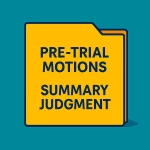 Introduction To Pre-Trial Motions and Summary Judgment. As litigation approaches trial, pre-trial motions become a central strategic tool. This phase is about shaping what the judge or jury will hear, what evidence will be admitted, and even whether a trial is necessary at all. For attorneys—especially those working internationally or in a second language—fluency in… Read more: Pre-Trial Motions and Summary Judgment-Essential Litigation Vocabulary-Part 5
Introduction To Pre-Trial Motions and Summary Judgment. As litigation approaches trial, pre-trial motions become a central strategic tool. This phase is about shaping what the judge or jury will hear, what evidence will be admitted, and even whether a trial is necessary at all. For attorneys—especially those working internationally or in a second language—fluency in… Read more: Pre-Trial Motions and Summary Judgment-Essential Litigation Vocabulary-Part 5 - Discovery Phase-Essential Litigation Vocabulary-Part 4
 Introduction To The Discovery Phase. The discovery phase is often the longest and most complex part of litigation. It is the stage where both parties exchange information, investigate facts, and gather evidence that will shape their legal strategies. Mastery of the litigation vocabulary language used during discovery is critical—not only to comply with procedural rules… Read more: Discovery Phase-Essential Litigation Vocabulary-Part 4
Introduction To The Discovery Phase. The discovery phase is often the longest and most complex part of litigation. It is the stage where both parties exchange information, investigate facts, and gather evidence that will shape their legal strategies. Mastery of the litigation vocabulary language used during discovery is critical—not only to comply with procedural rules… Read more: Discovery Phase-Essential Litigation Vocabulary-Part 4 - Defenses & Responsive Pleadings-Essential Litigation Vocabulary-Part 3
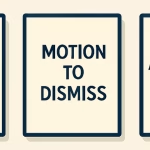 Introduction: Defenses & Responsive Pleadings After a lawsuit is filed, the defendant’s response becomes the first major pivot point in the litigation. This stage introduces critical tools that may limit, delay, or even extinguish the plaintiff’s claims—before the case reaches discovery or trial. Lawyers must not only understand the procedures but also command the litigation… Read more: Defenses & Responsive Pleadings-Essential Litigation Vocabulary-Part 3
Introduction: Defenses & Responsive Pleadings After a lawsuit is filed, the defendant’s response becomes the first major pivot point in the litigation. This stage introduces critical tools that may limit, delay, or even extinguish the plaintiff’s claims—before the case reaches discovery or trial. Lawyers must not only understand the procedures but also command the litigation… Read more: Defenses & Responsive Pleadings-Essential Litigation Vocabulary-Part 3
-
27 Useful English Expressions for Lawyers in the Workplace
Strengthen Your Communication Inside and Outside the Office with 27 Useful English Expressions for Lawyers in the Workplace
Introduction
For lawyers — especially those working with business teams or serving as in-house counsel — mastering everyday business English phrases is just as important as understanding legal terms. These expressions often appear in emails, meetings, and client conversations. Misunderstanding them can cause confusion, while using them correctly can build trust and professionalism.
Here are 27 useful phrases explained with their meaning, usage, and examples so you can understand and apply them with confidence.
Everyday and Useful Business Phrases That Lawyers Should Know
1. “Sorry to bother you”
- Meaning: A polite way to interrupt or ask for help.
- Usage: Used in emails or conversations before making a request.
- Example: “Sorry to bother you, but could you send me the final version of the contract?”
2. “Always at the last minute”
- Meaning: Describes something done just before a deadline.
- Usage: Often used to criticize procrastination or rushed work.
- Example: “He files his motions always at the last minute.”
3. “He threw me under the bus”
- Meaning: To betray or blame someone unfairly.
- Usage: Informal, common in office politics or disputes.
- Example: “During the board meeting, he threw me under the bus to save himself.”
4. “He didn’t look at anything”
- Meaning: Did not review the documents or materials.
- Usage: Refers to negligence or lack of due diligence.
- Example: “He didn’t look at anything before approving the budget.”
5. “He blames me for his own decisions”
- Meaning: Shifting responsibility unfairly.
- Usage: Often used when discussing accountability.
- Example: “He blames me for his own decisions about the merger.”
6. “Prepared an email”
- Meaning: Wrote or drafted an email.
- Usage: Standard workplace language.
- Example: “I prepared an email to update the client about the case.”
7. “A performance evaluation”
- Meaning: A formal review of someone’s work.
- Usage: Common in HR and employment law contexts.
- Example: “Her performance evaluation showed excellent progress.”
8. “Work and personal references”
- Meaning: People who can speak about someone’s professional or personal qualities.
- Usage: Often required in recruitment or background checks.
- Example: “The firm requested work and personal references before hiring.”
9. “Atypical”
- Meaning: Not usual; out of the ordinary.
- Usage: Useful when describing exceptions.
- Example: “It was an atypical case because the contract had no termination clause.”
10. “Behaved with” / “Get along with”
- Meaning: How someone interacts with others.
- Usage: Describes workplace conduct or relationships.
- Example: “He doesn’t get along with his colleagues, which creates problems.”
11. “Insubordinate”
- Meaning: Refusing to obey a superior’s orders.
- Usage: A formal HR and employment law term.
- Example: “The manager disciplined the employee for being insubordinate.”
12. “Followed directions”
- Meaning: Complied with instructions.
- Usage: Refers to obedience or compliance.
- Example: “She followed directions exactly as outlined in the memo.”
13. “Scapegoat”
- Meaning: A person unfairly blamed for others’ mistakes.
- Usage: Common in both legal and business disputes.
- Example: “He became the scapegoat for the project’s failure.”
14. “He did nothing”
- Meaning: A period of inaction or negligence.
- Usage: Often used in criticism or reporting misconduct.
- Example: “He did nothing for 5 days, which delayed the filing.”
15. “I am looking forward to it”
- Meaning: Expression of positive anticipation.
- Usage: Polite professional closing, especially in emails.
- Example: “I am looking forward to our meeting next week.”
16. “The buck stops with them”
- Meaning: They have final responsibility.
- Usage: Common in leadership or management contexts.
- Example: “The buck stops with the general counsel on compliance matters.”
17. “Immaturity”
- Meaning: Lack of development or judgment.
- Usage: Sometimes raised in conduct or capacity issues.
- Example: “His immaturity affected his ability to manage the case.”
18. “Collegially”
- Meaning: In a cooperative and respectful way with colleagues.
- Usage: Often used in professional or academic contexts.
- Example: “The partners worked collegially to finalize the deal.”
19. “I would have quit”
- Meaning: A hypothetical past action.
- Usage: Used to express how someone might have acted under conditions.
- Example: “If I had been in that situation, I would have quit.”
20. “Find a replacement” / “Find someone else”
- Meaning: To replace a person or role.
- Usage: Used in staffing and contract obligations.
- Example: “We need to find a replacement for the departing associate.”
21. “We don’t get along well” / “We don’t work well together”
- Meaning: There is conflict or poor cooperation.
- Usage: Common in workplace and partnership disputes.
- Example: “We don’t work well together on projects.”
22. “To him or her” / “He explained something to me”
- Meaning: Shows correct grammar for indirect objects.
- Usage: With the verb explain, English requires “to” before the person. You cannot say “He explained me something.”
- Example: “The judge explained the procedure to me.”
23. “What is your management style?”
- Meaning: A question about leadership approach.
- Usage: Common in interviews or performance reviews.
- Example: “The interviewer asked, ‘What is your management style?’”
24. “Indicative of”
- Meaning: Sign or symptom of something.
- Usage: Often used in analysis or arguments.
- Example: “His behavior was indicative of negligence.”
25. “Taking your job seriously”
- Meaning: Being committed and professional.
- Usage: Expresses dedication to work.
- Example: “She is known for taking her job seriously.”
26. “I wouldn’t mention it”
- Meaning: Advice to omit certain details.
- Usage: Used in sensitive disclosure contexts.
- Example: “I wouldn’t mention it during the negotiation.”
27. “Contentious” / “Heated argument”
- Meaning: Describes a serious dispute or argument.
- Usage: Common in litigation and negotiations.
- Example: “The discussion became contentious during settlement talks.”
Conclusion
Understanding these 27 phrases will help lawyers operate confidently in business and legal environments. Using them correctly will improve clarity, strengthen professional relationships, and demonstrate credibility in cross-border or in-house counsel settings.
Legal English Tutoring
Strengthen your legal or business English communication skills with personalized English tutoring.
Explore some of our other posts.
Disclaimer
DISCLAIMER: The content provided herein is only for discussion purposes and may contain errors. The reader is responsible to confirm the accuracy of the information provided. The content does not constitute legal or professional advice. We disclaim any liability for any loss or damage incurred directly or indirectly from the use of this information.


